Fall 2015 A publication of the Wildlife Division—Getting Texans Involved
Pollinators in the City
Pollinators are vital to the environment and to our future, but in far too many cities, they are becoming a rare site. The plight of the monarch has brought this to the media recently, but we could look at bees, other butterflies, hummingbirds and more species and find numbers small to non existent in many of our cities. This issue of our newsletter looks at simple things we can do to make our cities more inviting to pollinators.
Urban Butterfly Gardens
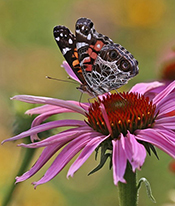
By Dr. Cathryn A. Hoyt
I love butterflies. They're such polite insects—they don't bite, sting, or try to crawl around your plate while you’re having a picnic. They'll only come to your garden if properly invited and there are many reasons to invite them. Butterflies are beautiful and important pollinators for many plants.

Texas' State Insect Needs Texans
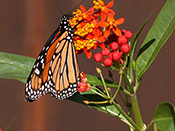
By Ben Hutchins
Over the last year, monarch butterflies have been receiving a lot of attention because of alarming population declines. Whether you are a rancher that works tens of thousands of acres or a denizen of the big city with a window sill garden, everyone can make sure that both adult monarchs and their caterpillars have the food resources they need to make their amazing migratory journey.

Creating a Demonstration Area
By Mimi Mancuso
The Fort Worth Nature Center has a wonderful Wildscape Demonstration Area that provides for the needs of not only pollinators, but those of several other wildlife species as well. Mimi Mancuso provides an outline of how the area was developed.

Solitary Bees: Unappreciated Majority
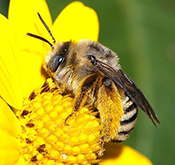
By Michael Warriner
The term "solitary bee" seems a misnomer at first as the most familiar bees in Texas (European honeybee and bumblebees) are social insects that live in colonies consisting of a queen and her cooperating labor force. Social bees are the exception as far as most bees in the state are concerned, however. Well over 90% of the nearly 700 bee species documented from Texas actually lead solitary lives.

The Laughing Garden and other happy happenings at Harlingen's Hugh Ramsey Nature Park
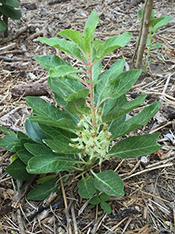
By Anita Westervelt
Harlingen's Hugh Ramsey Nature Park spent almost a hundred years as a trash dump. Today, even in the dead, still, heat of a south Texas summer, the park is teeming with blooms, butterflies, dragonflies, wasps, bees, birds and critters. Due to the vision some twelve years ago of nearly a dozen volunteers from the Rio Grande Valley Chapter Texas Master Naturalist, the 55-acre park (just two miles south of the Valley International Airport) is a dynamic showcase of the native plants of Deep South Texas.

Urban Milkweed Sustains the Monarch Migration Phenomenon
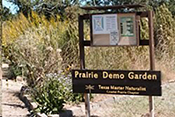
By Barbara Keller-Willy
As you have probably heard by now, the Monarch Butterfly's North American migration phenomenon is in peril. In 2015 President Obama enacted the "National Strategy to Promote the Health of Honey Bees and other Pollinators" which included goals to preserve the monarch migration. On October 13, 2015 former first lady, Laura Bush, TPWD's Carter Smith, and other partnering federal government agencies held a press conference to announce the "Texas Monarch/Native Pollinator Conservation Plan", the result of a working group of Texas state agencies and nonprofits year-long coordination.

The Back Porch - What Have We Got to Lose?
By Mark Klym
Biologists, ecologists, naturalists and all people who love the outdoors have heard the question more times than they wish to remember - "If that species goes extinct, what have we got to lose?"

Wild Stuff!
Help protect native non-game species like the Horned Lizard with the purchase of the Horned Lizard license plate. The cost is just $30*, with $22 going directly to benefit the conservation of wildlife diversity in Texas.
Order online today and get your plate in just two weeks!
*In addition to regular vehicle registration fees.
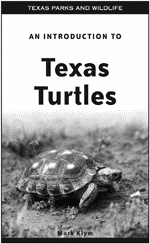
Introduction to Texas
Turtles Booklet
Send an email request to mark.klym@tpwd.state.tx.us
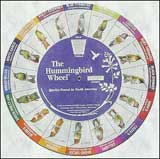
Hummingbird Wheel
This 10" full-color identification wheel is a helpful reference to keep nearby when you watch the hummingbirds. Sixteen hummingbird species are featured, all of which have been documented in Texas! For each bird, the wheel tells you its range in North America, Habitat Type, and distingishing features of both males and females.
To order visit the Texas A&M AgriLife Extension Bookstore.

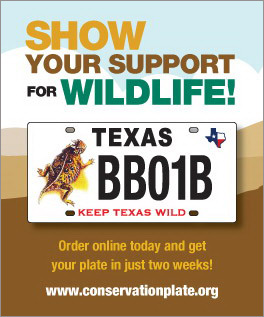
 Texas Parks and Wildlife Department, 4200 Smith School Road, Austin, TX 78744
Texas Parks and Wildlife Department, 4200 Smith School Road, Austin, TX 78744


